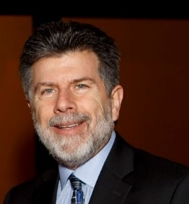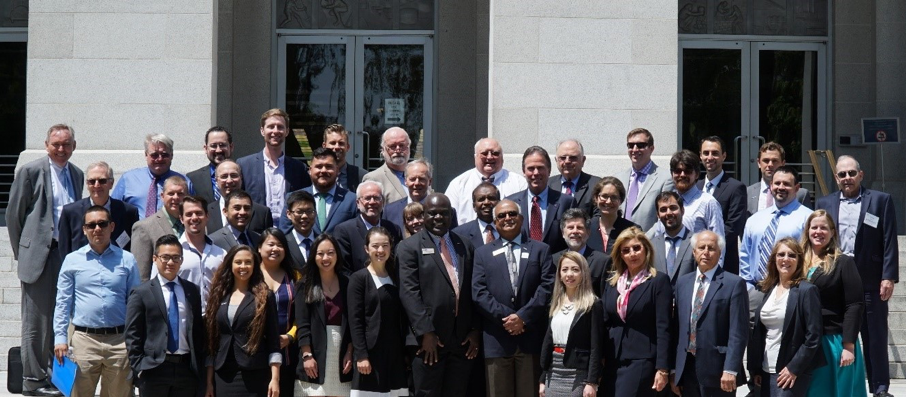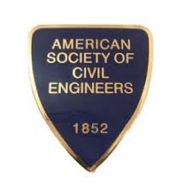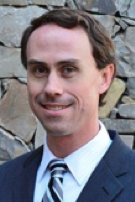September 2019 – Region 9 Reports
REGION 9 REPORTS – SEPTEMBER 2019 NEWSLETTER
Government Relations Committee Update
ASCE Region 9
By Kenneth H. Rosenfield, P.E., F.ASCE
Chair, ASCE Region 9 Government Relations Committee
Co-Chairs, ASCE Region 9 California Infrastructure Report Card Task Committee

The Government Relations Committee (GRC) of Region 9 has had a busy year of active reviews of proposed legislation, the planning of the very successful May 7th Sacramento Fly-in and the planning for the upcoming Legislative Drive-ins during December 2019. On a recurring basis, the GRC holds telephone conferences to discuss pending legislation that is of interest to civil engineers and ASCE and which are not otherwise reviewed by the other two related Region 9 committees; the Water and Environment Committee and the Transportation and Development Committee. For the current legislative year, which runs from January to September, the GRC reviewed approximately 20 bills and recommended positions be taken by the Region 9 Board of Governors on seven bills.
While the State Legislature focused heavily upon housing issues this year, there were still many bills impacting infrastructure including earthquake readiness, school building replacements, Infrastructure Facilities Districts funding and proposed bond measures. I will not review the particulars of these bills here because our advocate in Sacramento, Mr. Richard Markuson of the Pacific Advocacy Group, provides a comprehensive monthly article covering all proposed legislation. The GRC, comprising 23 ASCE members, have diligently volunteered their time to assist the process of legislation review and I thank them for their commitments and efforts.
Our signature event occurred on May 7, 2019, when ASCE Region 9 members gathered on the State Capitol grounds for an exciting day of Legislative Advocacy training and action! It was a beautiful day in Sacramento as we gathered under a tent in the park area just east of the Capitol buildings. The morning began with the unveiling of the 2019 California Infrastructure Report Card with comments provided by Region 9 Director Kwame Agyare, P.E., and 2020 ASCE President K.N. (Guna) Gunalan, P.E. The Report Card was presented by the California Infrastructure Report Card Co-Chairs Tony Akel, P.E. and John Hogan, P.E. The Report Card release was a significant achievement and one which helps us to emphasize the message to our legislators that there is much work to be done to raise the overall infrastructure grade of C- to at least the B grade level.
After the Report Card release, the day continued as I welcomed our members to the legislative advocacy training portion of the day in preparation for our scheduled visits to our legislators. Maria Matthews, Senior Manager of ASCE’s Government Relations Program, provided an in-depth “Government Relations 101” course to our members and Richard Markuson presented the Region 9 briefing papers and overall objectives for the day’s visits with legislators. It was then our pleasure to receive comments from Assembly-member Luz Rivas of the Los Angeles Area. Ms. Rivas encouraged our membership to remain engaged in legislative advocacy and to develop relationships with elected officials. She expressed appreciation for all of the ASCE efforts in government relations! Our members then made scheduled visits with their legislators and also helped to pass out the new 2019 California Infrastructure Report Card to all 117 legislative offices. It was a great and successful day in the State Capitol! 
May 7, 2019, Legislative Day Attendees on the steps of the State Capitol.
Our next major initiative is to work to leverage the California Infrastructure Report Card and strengthen our relationships with State Officials and Elected Officials by encouraging them to address the State’s infrastructure needs. We are also exploring the opportunities to push for the use of some of the State’s budget surplus for one-time infrastructure spending in the next legislative year. Planning is already under way to encourage our members to group together this December and visit elected official’s offices, when they often hold open houses and holiday gatherings, to discuss with our elected officials the State’s infrastructure needs. Please watch for more information in the coming months on the December drive-in opportunities. Beginning again in January, the State Legislature session will convene, and we will again engage in legislation reviews.
The ASCE Region 9 Government Relations Committee actively monitors and recommends positions on statewide legislative and regulatory proposals that affect civil engineers and support the standing policies of ASCE. The committee is also responsible for coordinating the annual Region 9 Legislative Fly-In and the follow up local visits, which are intended to encourage an ongoing dialogue between ASCE members and their legislators on issues of importance to ASCE. If you would like to learn more about the activities of the Region 9 Government Relations Committee or have any questions, please contact me at KRosenfield@lagunahillsca.gov.
ASCE Code of Ethics Reboot
by The Society Board of Direction

You may have seen the recent article in the July 24th edition of the ASCE News https://news.asce.org/board-hits-refresh-on-code-of-ethics-strengthens-member-engagement/ which relates to an initiative to pursue a wholesale rewrite of the Society’s Code of Ethics. For the first time in nearly 50 years, ASCE is pursuing a wholesale review of its Code of Ethics. The Task Committee on the Code of Ethics presented a plan for a more streamlined code to the ASCE Board of Direction at the quarterly Board meeting, July 12-13, in Reston, Virginia. The Board voted to support the task committee’s concept and general direction and is scheduled to receive a task committee’s update at its October 2019 meeting.
A link to the current Code of Ethics can be found here: https://www.asce.org/uploadedFiles/About_ASCE/Ethics/Content_Pieces/Code-of-Ethics-July-2017.pdf . The existing Code of Ethics comprises 8 fundamental canons, and originally established 4 fundamental principles that stated “Engineers uphold and advance the integrity, honor and dignity of the engineering profession by:
- using their knowledge and skill for the enhancement of human welfare and the environment;
- being honest and impartial and serving with fidelity the public, their employers and clients;
- striving to increase the competence and prestige of the engineering profession; and
- supporting the professional and technical societies of their disciplines.”
There will be multiple ways for ASCE members to provide their input to the rewrite prior to a formal vote of the membership, and an ASCE Collaborate discussion has been initiated where members are already participating in the discussions. Click HERE to participate in those discussions.
Also be on the lookout for more ways in which to provide your feedback to the ASCE Code of Ethics Revision process, or you may contact Kwame Agyare, Region 9 Director, at Agyare.kwame@gmail.com for further information.
Region 9 Upcoming Leadership Changes – an Outgoing Region Governor’s Observations
by Matt Kennedy, P.E., T.E., M.ASCE External Secretary, Region 9 Board of Governors; and Region Governor from the San Francisco Section

As the end of the current fiscal year approaches on September 30th, a change in the makeup of the Region 9 Board of Governors will occur. Thor Larson’s term as the Governor representing the Sacramento Section will end, and my term as the Governor representing the San Francisco Section will also come to an end. It is hard to believe that Thor and I began our terms three years ago! Time certainly does fly with the number of events and activities the Region 9 Governors are involved with. It has been a pleasure and an honor to represent you and the most active Region in ASCE. Thank you for all your involvement and support!
Like many Region Governors before me, service to Region 9 was a natural progression of my service to ASCE and the civil engineering profession over the last 21 years. Since I was a senior in high school, I always knew I wanted to be a civil engineer, even though I didn’t truly know what that meant. It wasn’t until much later that I gained an appreciation for the positive impact civil engineers have on society, and the important role ASCE and our members play in elevating the profession and advocating for its continued growth and prosperity. Civil engineers build civilizations and are arguably the most important and impactful profession shaping the built environment and the world as we know it. From local to global communities, ours is a profession that makes a real and direct impact on the quality of people’s lives, and I am proud to be a part of such a thoughtful, ethical and hard-working group of diverse individuals who are passionate about making the world a better place.
After being encouraged by a professor, I joined ASCE as an Environmental Resources Engineering student at Humboldt State University (HSC) in 1998, and my involvement has only grown since. I served on the HSU Student Chapter for three years until my graduation in 2001. During that time, I helped to organize and participated in numerous events, including what I believe was the first ASCE Mid-Pacific Student Conference (MidPac) Water Treatment Competition, which was held at the University of Nevada, Reno in 2000. Following a 2-year hiatus from ASCE for graduate school, I returned as a board member on the North Coast Branch in 2003, serving as the Practitioner Advisor to HSU. I landed my first job after college as a staff engineer in a consulting firm, and I got the job through relationships I made through ASCE while a student at HSU. I am proud to say that 16 years later I am principal engineer working for the same company. I served as a North Coast Branch board member for three years and was impressed by the strong connection between the Branch and the HSU Student Chapter, which continues to this day. In 2007, I moved down to Santa Rosa and volunteered to serve as the San Francisco Section Treasurer, a position I held for 5 years. I continued to serve on the SF Section board as Vice President (2013), President-Elect (2014), President (2015) and Past-President (2016). It was during this time that I really got to know ASCE well and gained a greater understanding of the depth and breadth of our organization, what we do, and who we represent. We are a global organization rooted in local members. I was also exposed to the many active groups within the SF Section whose members make such a positive impact on the profession and the community.
Tradition has it that the SF Section Past-President is the organizer and MC of the Section Annual Meeting and Awards Banquet. While fulfilling this duty I also took over the role of Region 9 Awards Committee Chair from current Region 9 Director Kwame Agyare, a position I held for three years. Being the organizer and MC for Region 9 Awards, which recognizes the outstanding projects and members in Region 9, was an incredibly gratifying experience. We are a Region made up by amazing people doing amazing projects!
Shortly after accepted the Awards Committee Chair role, I also accepted the opportunity to serve as the Region 9 Governor representing the San Francisco Section. These past three years as one of seven Region 9 Governors have been very busy and very fulfilling. I have had the opportunity to travel and meet so many engineers from diverse backgrounds doing amazing things to better our world through their daily work and through ASCE.
During all of the years I have been in the service of ASCE, and my changing roles and responsibilities, ASCE has been testing and evolving how the Society better serves its members, and how it can better represent the values of the members and prepare for the challenges of the future. Growing up I was taught that there are two sure things in life: death and taxes. However, be assured that “change” is also guaranteed. The acceleration of technological growth and the rapid changes and innovation that it enables is continuously affecting nearly every aspect of society. It is changing the way we do business and how we solve the engineering challenges of today and tomorrow. From improvements in cellular and network communications, to autonomous vehicles and innovative materials, change is something civil engineers must accept and embrace as a constant in our profession, and in the way that we deliver projects. At no other time in human history has technological change advanced at such as rapid pace as now, and it is only expected to continue.
ASCE recognizes that change is imminent, and has responded through the development of Key Programs focused at addressing the challenges and opportunities brought about by rapid change. These are:
Grand Challenge, which aims to close the infrastructure gap from planning to design to delivery;
Infrastructure, which proposes practical solutions to maintain and modernize our nation’s deteriorating infrastructure;
Sustainability, which embraces and encourages civil engineers’ role as contributors to a sustainable world; and
Engineer Tomorrow, which aims to ensure civil engineers have the necessary knowledge, skills, and attitudes to practice in the future.
In addition to changes, and challenges, brought on by improving technology, recognition of the importance of diversity and inclusion is elevating the civil engineering profession to a new level. We must encourage and empower our members, and the companies and agencies the work for, to provide an equal opportunity for all to succeed, regardless of gender, cultural or other differences. Our willingness to embrace diversity of thought, background and experience helps us create imaginative and responsive solutions for our clients and the communities we serve.
We are all fortunate to have ASCE organizing and advocating for our profession. I am also lucky to have an amazing employer who is a champion for diversity and inclusion in the workplace, and who understands the challenges and opportunities brought on by our rapidly changing world and technology. Recognizing the challenges is the first critical step in taking positive steps to address them, to improve people’s lives, and to help build a better local and world community through improvements to infrastructure.
Your membership in ASCE is only the first step in supporting the civil engineering profession and seeking solutions to the world’s future challenges. ASCE is what the members make it. It is primarily a volunteer organization, with limited professional staff supporting our interests and needs. To keep ASCE relevant, it is necessary everyone to take on a role and become an active member. There are numerous opportunities for you to contribute to ASCE, such as volunteering to join committees, organize events, and join boards of Younger Member Forums, Branches, Sections, Life Member Groups, the Region, Technical Groups and Institutes. This article represents my personal views and experiences enhanced through ASCE, which I hope will reach you and encourage you to become a volunteer. Your participation in ASCE is critically important to our profession and to the communities we serve as civil engineers. You will get more out of the experience than the time you put in.
While my role as Region 9 Governor may be ending, my involvement will not. I look forward to my continued service to ASCE, and future opportunities to improve our profession and enhance our members’ value. Please contact me if you have any questions or suggestions at matt.kennedy@ghd.com.
